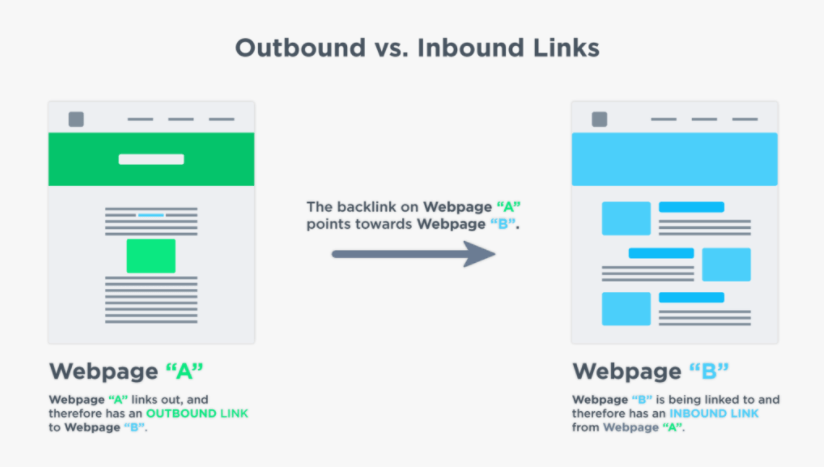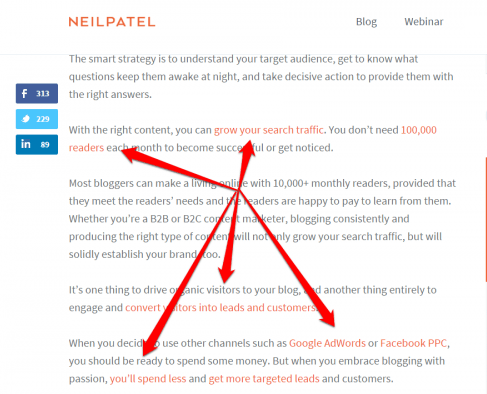If you have at least some experience in SEO, you know that backlinks are important. It is no secret that getting and providing links can help you get a higher rank. Today, let’s see how this actually happens by explaining the inbound and outbound links.
Inbound links are all backlinks pointing to your site from other websites, while outbound links are links from your site to other websites.
Generally, Google views your inbound links as a reference to your high-quality content and your outbound links as an endorsement of other valuable content.
Both inbound and outbound links are important to SEO because they enhance the user experience and provide additional context for Google. The first part of this equation, the user experience is important because hyperlinks are how users navigate the web. Without them, it is almost impossible for users to find and visit other pages.
The second part deals with Google’s own algorithms. Google needs a way to assess the quality of each web page before showing it to users. To do this, Google decided to use a more objective measure as one of its main symbols: the external “voice of confidence”. These external voices of faith are similar to the way citations work in academia, but in the case of the Internet, the codes are just hyperlinks.
Over the years, these two factors have merged somewhat. Both incoming and outgoing links that provide a user experience are generally considered good links by Google.
For example, a well-positioned, contextual outbound link prompts users to learn more about the topic you cover in your content. From Google’s point of view, it explains (or at least hints) why you are linking specific content to everything on the same topic. Similarly, links to your website (such as inbound links) from other websites will notify Google that your content has been highlighted in some way.
In both cases, the anchor text – the clickable word you use in the links – gives Google a great idea of why users should visit that other page. Additionally, text around anchor text (some SEOs even name entire paragraphs) gives Google an idea of the value of the linked page.
This will help Google in another way. The interaction of anchor text with content makes it easier for Google to detect backlink schemes that are trying to trick the system.
Following this logic, “click here” links are less important than links with anchor text such as “SEO study of the Morning Score”. For this reason, the best incoming and outgoing links provide the context around the link.
Table of Contents
What is the difference between inbound and outbound links?
Although they look the same, there are some differences between inbound and outbound links. If these two links are simple backlinks, it is up to the website in question to decide whether the link is inbound or outbound. I will clarify
Generally, both incoming and outgoing links share certain rights of the source website with the destination website. Inbound links are your backlinks from other websites and they give you more rights. Meanwhile, outbound links share the authority of your page with other pages.
The difference between inbound and outbound links lies in their functionality and their impact. These two types of links work just like normal backlinks. That is, they transfer authority between websites, even if they are in Do-follow. Functionally, however, they are different where the backlink is placed (i.e., source) and where it goes (i.e., destination).
Inbound links are your backlinks from other websites. They usually give more authority to your site than the parent site they link to. On the other hand, outbound links are all the backlinks you create on your website that point to pages on other websites. Since in this case, your website is the source, you are sharing some rights to your page with the target website.
There is a difference in how authority (also known as PageRank value) goes through each website involved. When you receive an incoming link, the PageRank value of the website that links to you is transferred to your page. From there it will increase the value of your page so that it has a better chance of ranking on Google.
Meanwhile, outbound links transfer link juice from your page to the linked page on another website. Just as other web pages send links to your web pages, your web page passes its collective rights to other pages. Fortunately, this system is thought out to the smallest detail. Your pages will not lose link juice due to links to other pages, instead, they will get traction.
Are incoming and outgoing links the same?
Although incoming and outgoing links refer to backlinks (i.e. hyperlinks), they do not represent the same type of link. The term “inbound links” refers to all backlinks to other websites that refer to your website. In contrast, “outbound links” are all hyperlinks that point from your website to other websites. Generally, an incoming link to a site is an outgoing link to a referring site.
To determine whether a link is inbound or outbound, the source (direction) of the link must be considered. If you are looking for inbound links, you are usually looking for links that point to a specific website or web page.
For now, suppose you are trying to find outbound links to a website. In this case, you will be looking for all the hyperlinks that indicate a suspicious website.
To understand this, imagine the relationship between two websites that link one website to another. If we set our checkpoint as a linking website, we can identify the link as outgoing. Conversely, if our point of reference is a linked website, the link will be inbound. Here is an example of this backlink for two websites provided:

As you can see in the example above, the backlink created on web page “A” refers to web page “B“. This link is an outgoing link to the “A” web page because it comes from their website. However, for web page “B“, this link is an incoming link because it comes from another website.
Links that are internally linked to your website are called “inbound”, while links outside your website are called “outbound“.
What is an inbound link?
As we have established, inbound links are all links that lead to your site from other sites. Inbound links are also known as backlinks. They are usually one of the strongest Google ranking factors, especially since they are of high quality.
Inbound links are all inbound backlinks to pages on your site from other pages on other sites. In general, inbound links act as “trust votes” that distribute authority between websites. High-quality inbound links are one of the strongest ranking factors for third-party SEO.
In general, you can think of an inner word as a word that refers to something else. To talk; When we suggest inbound links, it is important to provide a starting point.
All links to a particular website from other websites are considered inbound to that website. For this reason, the term “inbound links” is often used to refer to a specific website. For example, an SEO expert might say, “There are 20 incoming links on your website.”
Inbound links act as a voice of trust between websites. Usually, when search engines look at incoming links, they see that one website is trying to recommend another. From now on, Google will evaluate the validity of backlinks using a number of other factors.
All of these will help determine if the incoming link really increases the authority of the target website. Because of this, we generally say that if a page has more quality inbound links, it will be easier to rank.
Obviously, many things play an important role in SEO and the quality of your incoming links is also important. If you are actively building links or working on partnerships to improve your link building, focus on high-quality incoming links. This will not only help you improve your ranking, but also prevent you from losing ranking when using low-quality backlinks.
Example of Inbound Link :
Let’s take a quick look at the actual example of an inbound link. For easy understanding, I’ll show you one of the incoming links we received at Morningscore from the shortpixel.com website, where they will link us to their page.

As you can see, they have contacted one of our resources called “Push vs. Pull Marketing” through your content. This will immediately “inbound” us the link to our website. The link is no different from the other backlinks you suggest on your site.
What is an outbound link?
Outbound links are all hyperlinks on your website that refer to pages on other websites. These links are also important to Google because they represent trust in the content you link to.
Outbound links are all backlinks to pages on your website that refer to pages on other websites. Generally, outbound links act as “votes of confidence” that share your website’s specific rights with the target website. Links to high-quality pages will increase your ranking.
Since outbound links are backlinks that point from your website to other websites, it means that you are sharing the authority of your page with other web pages. The copyright of your page will be distributed to the outbound links in your article and they will benefit from it.
The authority of the web page is unequally distributed among the outbound links to your page. This is because some authoritative data is related to your internal links (ie, links to other pages on your website). Furthermore, most SEOs agree that links at the top of the page are more valuable than links at the bottom of the content. In general, the links placed at the top of the page are more likely to be visible to website visitors.
However, in general, outbound links do not necessarily validate your right to share your page with others. While most outbound links can damage your SEO, on average, some well-placed outbound links can improve it.
SEO believes this happens for three main reasons:
You add value to your page by providing better resources. Visitors who visit your pages can be sure that you want to help them.
- External links show search engines that you are linking to the most valuable resources and that
- customers can trust your work. It works with the first point.
- Using external links encourages others to provide you with more backlinks when you use them for statistics and to verify opinions.
It is important to note who you are linking to? as you have no direct control over the content on other websites. Because of this, link only to the most valuable content that you trust and believe to be accurate and authentic (albeit subjective). This is because low-quality websites can also change the content or ownership of the page.
Example of outbound link:
To better understand outbound links, let’s look at a real-life example. And for simplicity, we will look at an example similar to the incoming link, but with an explanation of the outgoing links.

We can also specify that the link above is outgoing from the website that links us. When a site links to a page that is not part of its domain, that link is immediately considered “outbound”.
As you can see, the difference between incoming and outgoing links can be technically a benchmark for source and destination websites. A link between any two websites indicates that the site has an outbound link and the linked site has an inbound link.
How do inbound and outbound links help SEO?
If you have some experience with SEO, you know that backlinks are important. They help you get more exposure, traffic, and customers. Backlinks can help you get higher rankings by search engines showing that your pages are authoritative and relevant to the user search query.
In general, quality inbound links help transfer authority from the source website to the destination website. Outbound links to high-quality pages help indicate greater relevance and usability. Incoming and outgoing links indicate the relevance and authority of the page.
Page tags with many high-quality inbound links give Google the impression that many other website owners are interested in the content of that website. It is a demonstration that the material is valuable and reliable and worthy of recommendation. Since it is difficult to get quality incoming links, search engines will naturally reward you for having them. While some medium-quality inbound links may help you gain traction, it is usually best to avoid low-quality inbound backlinks.
On the other hand, outbound links can help provide signals to search engines that are trying to make your webpage a better resource. In other words, it’s your contribution to the development of the Internet. By incorporating relevant outbound links into your articles, you will help the user better understand the topic. Additionally, outbound links can help reinforce your arguments and give them meaning. Outbound links also increase trust and relationships with other companies, which will ultimately benefit both of you in the long run.
Do inbound and outbound links help SEO equally?
Having both incoming and outgoing links on the website is common and good for your SEO. However, inbound links are ultimately important for good ranking. Because having an inbound link means that other websites are sending their website authority (PageRank) to your website.
In general, inbound links help your SEO more than outbound links. Both types of links are good for SEO, but inbound links are a direct indication that other websites value your content. Meanwhile, outbound links indicate that you are presenting high-quality content to your readers.
For incoming and outgoing links, it is important to consider the authority of the website. A set of relevant studies confirms that inbound links can help in ranking. However, research shows not only how many backlinks you have, but also their quality. In other words, fewer backlinks from more official websites are more beneficial to the ranking than many lower quality backlinks.
For outbound links, the authority of the website indicates trust. While outbound links are great for user experience, they are not necessarily a decisive ranking factor. Although many studies have shown a correlation between good search engine rankings and outbound links, they are not the main point. In other words, when you link to other high-quality resources, outbound links will ultimately help your signaling confidence.
Hope You enjoyed this content. Don’t forget to share and leave comments. Thank You.
Other interesting reads:
What is Universal Search by Google?
Search Engine Optimization (SEO): An introduction for beginners
What is search intent & What are the 4 common types of search intent?
Advanced search method using operators






1 Comment
Antony
Hi all, here evrry person is sharing such knowledge, thus it’s
nikce to read this webpage, and I used to goo to see this weblog daily.
Neville
This article provides clear idea in support of the new people of blogging, that really how to do blogging.
Sonja
I’ve been browsing online more than three hours today, yet I never found any interesting article like
yours. It’s pretty worth enough for me. In my opinion, if all web owners and
bloggers made good content as you did, the internet will be much more useful than ever
before.
Tabatha
I always spent my half an hour to read this web site’s posts every
day along with a mug of coffee.
Isidra
Heya i’m for the first time here. I came across this board and I find It really useful & it helped me out much.
I hope to give something back and aid others like you helped me.
Melisa
Greate article. Keep writing such kind of information on your site.
Im really impressed by it.
Hey there, You’ve performed an excellent job.
I’ll definitely digg it and for my part suggest
to my friends. I am sure they will be benefited from this web
site.
Angus
Saved as a favorite, I love your site!
Berry
If some one wishes expert view concerning blogging and site-building after that i advise him/her to pay a
quick visit this website, Keep up the fastidious work.
Barrett
Thankfulness to my father who informed me concerning this website,
this webpage is in fact awesome.
Ngan
Very good information. Lucky me I discovered your blog by chance (stumbleupon).
I’ve bookmarked it for later!
Salvatore
This is very interesting, You’re an overly professional blogger.
I have joined your rss feed and look ahead to seeking extra of your magnificent post.
Additionally, I have shared your site in my social networks
Hannah
This is my first time pay a visit at here and i am actually happy to read all at alone place.